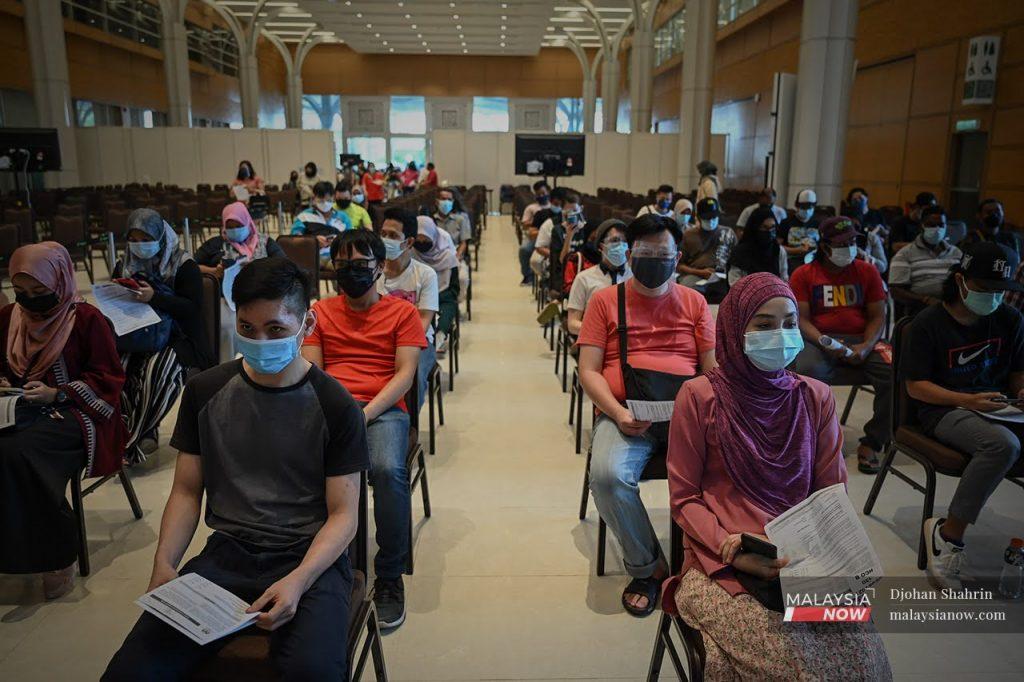80% herd immunity no longer the focus in Covid fight, says Khairy
He says the Delta variant has complicated herd immunity calculations, and that the focus should instead be on vaccinating as many people as possible.
Just In
The health ministry says it is no longer using the conventional formula of achieving at least 80% herd immunity among the country’s adult population to curb the spread of Covid-19.
Health Minister Khairy Jamaluddin said the world’s health experts had stopped using this formula and were instead focusing on vaccinating as many people as possible as the outbreak of the Delta variant had affected the previous herd immunity target of 80%.
“I, as health minister, am no longer using the herd immunity term. When we started the vaccination programme, we used the conventional formula to measure herd immunity which was 80% (of the adult population).
“That was before the spread of the Delta variant. This variant has basically affected the herd immunity calculations and it is difficult to say when we will achieve herd immunity. That is why we should no longer be looking at herd immunity.
“Instead, we should be looking at the widest vaccination possible,” Khairy said when winding up the debate on the motion of thanks for the royal address at the Dewan Rakyat sitting today.
He was responding to Ahmad Maslan (BN-Pontian) who asked why the infections and fatalities from Covid-19 in Malaysia were rising despite the vaccination rate of its adult population having reached more than 80%.
Malaysia achieved 80% full vaccination of its adult population on Tuesday, earlier than scheduled through the National Covid-19 Immunisation Programme (PICK) which was launched on Feb 24.
Khairy said PICK is now actively vaccinating teenagers aged 12 to 17 while for other children, the health ministry is awaiting the results of Pfizer’s vaccine tests.
He said while the number of Covid-19 cases is still high, important indicators have begun showing a downtrend, giving hope for the country’s recovery process.
“Compared to the situation a month ago, on Aug 23, bed usage involved 14,942 cases but today, the number has dropped to 10,321.
“The need for ICU care involved 1,542 cases but today, the number has declined to 1,114. On average, there were 251 cases over a seven-day period in August but the figure has dropped to 106.
“Of the current active cases recorded, 83% are in Category One and Two and only require quarantine at home; 10.7% have been sent to low-risk Covid-19 quarantine and treatment centres; 5.1% have been admitted to hospital and 0.5% require ventilators and intensive treatment,” he said.
He said the health ministry would continue strengthening public health strategies to flatten the curve of infection and break the virus transmission through the Find, Test, Trace, Isolate and Support (FTTIS) plan.
He said the ministry, with the cooperation of the respective state health departments, is preparing a National Testing Strategy to ensure that a given area can transit to the mitigation phase and hence determine the level of infection in that area.
On self-quarantine at home and concern over brought-in-dead (BID) cases, Khairy said the health ministry is working to identify the causes of these cases which were not monitored by the ministry or other health facilities.
“The ministry is very concerned about this situation. Up to August, 2,417 BID cases were recorded but it was clear that 2,200 such cases or 68% were not being monitored by the ministry or any private health facility.
“To make the public more confident in home quarantine, if they are being monitored by the health ministry, we will be sending devices such as pulse oximeters to them and ensuring that we can always be contacted so that if there’s a ‘red flag’, they will not be sent to hospital late,” he said.
On the delayed reporting of fatal cases, Khairy said this was happening not only in Malaysia but also in other countries such as the US, UK and India.
“This happens across our country but more so in Klang Valley as from the end of July until mid-August, the Klang Valley saw a significant increase in Covid-19 cases, resulting in heavy workload and constraints in terms resources, especially manpower,” he added.
Subscribe to our newsletter
To be updated with all the latest news and analyses daily.
